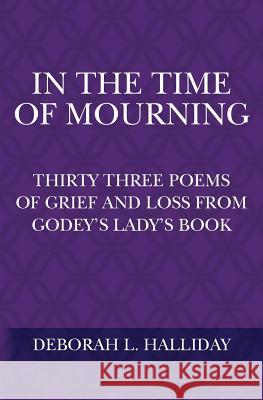In the Time of Mourning: Thirty Three Poems of Grief and Loss from Godey's Lady's Book » książka
In the Time of Mourning: Thirty Three Poems of Grief and Loss from Godey's Lady's Book
ISBN-13: 9781500340643 / Angielski / Miękka / 2014 / 82 str.
In the Time of Mourning: Thirty Three Poems of Grief and Loss from Godey's Lady's Book
ISBN-13: 9781500340643 / Angielski / Miękka / 2014 / 82 str.
(netto: 23,12 VAT: 5%)
Najniższa cena z 30 dni: 24,08
ok. 16-18 dni roboczych
Bez gwarancji dostawy przed świętami
Darmowa dostawa!
Grief and mourning are universal human emotions; we feel our losses keenly. Grief unfolds in many ways, and even when the most acute pain is over the loss of a loved one can be felt for a lifetime. In the early stages we often mistake a face in a crowd for our lost loved one, think we hear their voice, or forget that they are gone and plan to tell them something. In our society we are sometimes uncomfortable accepting and dealing with another's grief. We expect people to get over their loss, move on, and keep their mourning private. This was not so in the nineteenth century. There were formal rituals for mourning that included wearing black or gray for a specified period of time, wearing jewelry that included a lock of the loved one's hair, and in some cases, keeping loved ones close through burial on the family grounds or in a cemetery next to the church. The mourning poetry of the nineteenth century is a reflection of a culture that understood and accepted grief. Godey's Lady's Book was one of the most popular magazines in nineteenth century America, read by men and women alike in every state and territory. Each monthly volume of Godey's contained poetry; thousands of poems, written by both professionals and amateurs, appeared over the course of the magazine's five-plus decades. This poetry has not, until now, been systematically collected. This volume, In the Time of Mourning, presents thirty-three poems of grief and loss published between 1830 and 1874. A few of the earlier selections were copied by Godey from British publications; most of the later selections are original pieces from American poets. Authors include, among others, Thomas Haynes Bayly, Park Benjamin, Frances Kemble, Lydia Sigourney, William Gilmore Simms, Elizabeth Oaks Smith, and Richard Henry Stoddard. Each poet speaks to us directly of loss and sorrow. If you are suffering the pain that comes from the death of a loved one, I hope you will find some beauty and comfort in these pages.
Zawartość książki może nie spełniać oczekiwań – reklamacje nie obejmują treści, która mogła nie być redakcyjnie ani merytorycznie opracowana.











